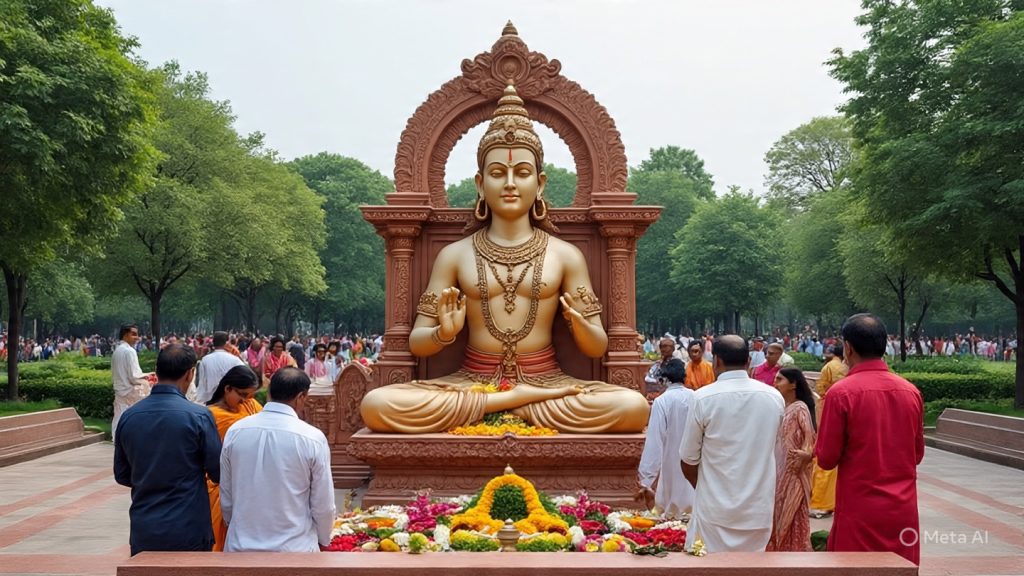Timeless Teachings of Lord Naminatha Swami: A Path to Peace in the Modern World 🌿
Introduction
The world we live in today is full of challenges—violence, stress, greed, and endless desires. Yet, more than 4,500 years ago, Lord Naminatha, the 21st Tirthankar of Jain Dharma, offered a path that leads to peace, balance, and true happiness. His teachings were simple yet deeply profound—offering solutions even for the most complex problems of modern life.
In this blog, let us explore the core teachings of Swami Naminatha and understand how his ancient wisdom remains timeless and relevant in our daily lives.
The Five Great Vows (Panch Mahavratas)
At the heart of Lord Naminatha’s teachings lie the Five Great Vows, known as Panch Mahavratas. These were not only meant for monks and nuns but were also guiding principles for householders and society.
1. Ahimsa (Non-Violence)
Lord Naminatha strongly emphasized Ahimsa in thought, word, and action.
- Ahimsa means not harming any living being—humans, animals, birds, insects, or even plants.
- For Naminatha, even a thought of hatred was considered a subtle form of violence.
💡 Modern Relevance:
- In today’s world of conflicts, war, and cruelty to animals, practicing Ahimsa can bring peace and healing.
- Choosing a vegetarian or vegan lifestyle is a powerful way to live this principle.
- Even avoiding harsh or insulting language is practicing Ahimsa.
2. Satya (Truth)
Truthfulness was a pillar of Naminatha’s teachings.
- Satya means speaking the truth with kindness, clarity, and responsibility.
- It is not enough to be honest; one must also speak in a way that does not harm others.
💡 Modern Relevance:
- In an era of fake news and misinformation, truth has become a rare virtue.
- Practicing Satya builds trust, respect, and strong relationships—both personal and professional.
3. Asteya (Non-Stealing)
To Swami Naminatha, stealing meant more than just taking someone’s physical belongings.
- It included cheating, plagiarism, exploitation, or taking credit for someone else’s work.
- Even taking more than what is needed was considered a subtle form of theft.
💡 Modern Relevance:
- Respecting others’ property, ideas, and time is key today.
- In workplaces, avoiding corruption, dishonesty, and shortcuts is true Asteya.
- Even wasting others’ time or resources is a violation of this vow.
4. Brahmacharya (Celibacy / Self-Control)
- For monks, this meant complete celibacy.
- For householders, it meant moderation, discipline, and purity in relationships.
Brahmacharya is about controlling desires, not letting desires control us.
💡 Modern Relevance:
- In today’s world of over-indulgence—whether in food, entertainment, or relationships—self-control brings mental clarity and emotional stability.
- It teaches us that true joy comes from discipline, not from excess.
5. Aparigraha (Non-Possession / Non-Attachment)
Lord Naminatha taught that attachment to wealth, objects, and people is the root of sorrow.
- Aparigraha is about living simply, letting go of greed, and not clinging to material things or outcomes.
💡 Modern Relevance:
- In a consumerist culture, people are constantly chasing the “next big thing.”
- Practicing minimalism, decluttering, and focusing on experiences over possessions are ways to live Aparigraha.
- It also aligns with environmental sustainability—a key global concern today.
The Three Jewels of Jainism (Ratnatraya)
Lord Naminatha also emphasized the Three Jewels, or Ratnatraya, which guide a person on the path of liberation:
1. Samyak Darshan (Right Faith)
Having faith in truth, the teachings of enlightened souls, and a reverence for life.
2. Samyak Gyaan (Right Knowledge)
Understanding reality clearly, free from superstition, and seeking true spiritual wisdom.
3. Samyak Charitra (Right Conduct)
Living a life of ethics, non-violence, discipline, and compassion.
💡 Modern Relevance:
These jewels promote a balanced life—one that is mindful, truthful, and compassionate. Qualities much needed in today’s divided, chaotic world.
Naminatha’s Teachings Beyond Religion
What makes Lord Naminatha’s teachings unique is their universal applicability. His principles are not limited to religion—they are principles of humanity and inner well-being.
- Ahimsa is the foundation of all peace.
- Aparigraha matches with minimalism and eco-friendly lifestyles.
- Satya brings strength to families and nations.
- Brahmacharya strengthens mental health and emotional balance.
These values build a society that is peaceful, just, and compassionate.
Practical Ways to Apply Naminatha’s Teachings Today
✅ In Daily Life:
- Pause before speaking—“Will my words cause harm?”
- Eat plant-based meals regularly.
- Practice gratitude instead of chasing more.
✅ In Professional Life:
- Be honest and transparent in your work.
- Respect others’ time, efforts, and ideas.
- Avoid all forms of corruption and shortcuts.
✅ In Family Life:
- Teach children kindness to animals and empathy.
- Solve family disputes through understanding, not anger.
- Celebrate simplicity and reduce material competition.
The Timelessness of Naminatha’s Message
When we look at modern problems—climate change, war, greed, and stress—we realize that Swami Naminatha’s teachings offer clear answers:
- If humanity embraced Ahimsa, wars would end.
- If we practiced Aparigraha, natural resources would be preserved.
- If societies lived by Satya, there would be harmony and trust.
His wisdom is not from the past—it is for all time.
Conclusion
Lord Naminatha was not just a spiritual teacher—he was a visionary who deeply understood the human mind and its suffering. His teachings of Ahimsa, Satya, Asteya, Brahmacharya, and Aparigraha are not outdated ideals—they are essential tools for anyone seeking peace, meaning, and liberation.
“All living beings long to live. No one desires to harm another. Therefore, do not hurt any living being.”
— Lord Naminatha Swami
In a world constantly rushing, competing, and consuming, Naminatha’s timeless message reminds us to slow down, live simply, and act with compassion. 🌸
